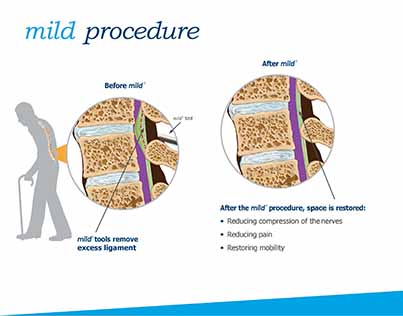
If you’re not receiving adequate relief from physical therapies or pain medications, mild® may be just what the doctor ordered.
What’s So Mild about mild®?
The procedure itself may be mild to a point, but the effects are definitely not. mild®, which stands for “minimally invasive lumbar decompression”, is a procedure designed to restore space in the spinal canal and decrease the compression of the nerves, reducing your pain and restoring your mobility. And for you, there’s nothing “mild” about that. This could be exactly what you’ve been looking for. In fact, once the mild® procedure is complete, most patients are able to return home the same day and are generally able to resume light tasks and everyday activities within just a few days.
How mild® Works
A mild® certified Michigan Pain Consultants physician, guided by an advanced imaging machine, will use specialized tools inserted through a tiny incision in your back. Your physician uses these tools to go between the bones to remove bone fragments or scrape out the ligament to widen the spinal canal, reducing nerve root compression. The result is a reduction in pain and improved physical functioning and mobility.
The mild® procedure decreases pain and increases mobility while maintaining the structural integrity of the spine. Because the bony architecture of the spine remains intact, spinal mechanics are not disrupted, and patients typically recover quickly. They are discharged home after a couple of hours and can begin the rehabilitation program. Patients are encouraged to walk regularly and/or participate in physical therapy following the procedure.
Contact Michigan Pain Consultants Today
Talk with your doctor to see if you are a candidate for the mild® Procedure.
Exciting medical procedures such as the mild® Procedure continue to keep Michigan Pain Consultants at the forefront of providing effective pain management in the West Michigan area.
Learn more about the mild® Procedure by making an appointment for a new patient consultation with one of our board-certified pain physicians. All of Michigan Pain Consultant’s physicians are Board Certified in Anesthesiology or Physical Medicine & Rehabilitation and have advanced training and experience in Pain Medicine. You can begin first by visiting online at MyLifeBeyondPain.com, MichiganPain.com, or by calling them at (800)281-3237. Michigan Pain Consultants – Better Treatments. Better Life.
With six locations throughout West Michigan, Michigan Pain Consultants comprehensive interdisciplinary approach to pain care offers patients and providers renewed hope for relief from chronic pain. Chronic pain should be treated like other chronic medical conditions such as diabetes, asthma, or congestive heart failure. Chronic pain requires chronic treatment. The goal of the treatment is to optimize the management of the pain, as opposed to curing the pain.
